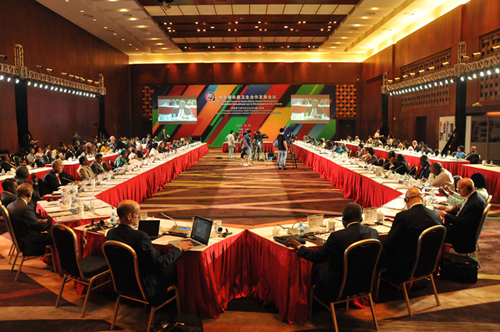 |
|
Chinese and African health ministers gathered for the first time at the Ministerial Forum of China-Africa Health Development held in Beijing on August 16, 2013 (COURTESY PHOTO) |
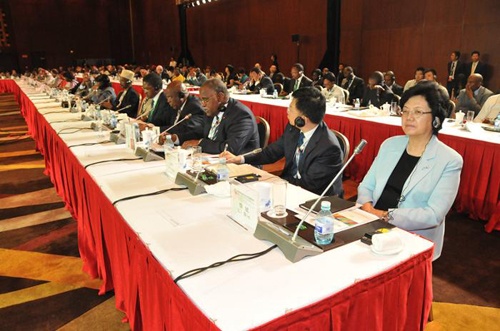 |
|
Chinese and African health ministers gathered for the first time at the Ministerial Forum of China-Africa Health Development held in Beijing on August 16, 2013 (COURTESY PHOTO) |
Chinese and African health ministers braved soaring Beijing temperatures to gather for the first time at the Ministerial Forum of China-Africa Health Development. Held in the Chinese capital on August 16, 2013, the forum aimed to map out new efforts to support Africa's long-term health progress and shape the future of China-Africa health cooperation.
The health gathering, opened by Chinese President Xi Jinping, is part of the Forum on China-Africa Cooperation (FOCAC), established in 2000. At the meeting, health ministers and officials launched the Beijing Declaration of the Ministerial Forum on China-Africa Health Development, under which China and African countries will embark on new efforts to find and implement sustainable, long-term health solutions.
"Human development is the core of development. We hope that this forum will substantially push forward health cooperation between China and Africa," Xi said at the forum.
This year marks the 50th anniversary of China sending its first medical teams to African countries. Li Bin, Minister of China's National Health and Family Planning Commission, reiterated China's commitment to building stronger China-Africa ties and noted the long and positive history of China-Africa cooperation on health.
More than 60 young Chinese and African researchers and scholars, as well as representatives from international organizations, discussed key areas that young people can work on to contribute to China-Africa health cooperation at the Roundtable of Young Leaders on China-Africa Collaboration, a part of China Health Forum 2013 held on August 17.
African health ministers, young scholars, and representatives of international organizations shared their views with ChinAfrica on the health challenges that Africa currently faces and the future prospects of China-Africa health cooperation. Excerpts follow:
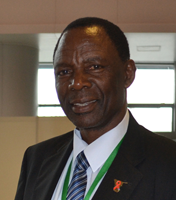
Richard Nchabi Kamwi,
Namibian Minister of Health and Social Services
China is the best in terms of traditional medicine. As Africans, we believe in traditional medicine and [know it] works. Chinese traditional medicine is modernized, and it complements African traditional medicine. We hope we can collaborate in the area of traditional medicine. Secondly, the Chinese are assisting us in constructing roads, and that facilitates the bringing of pregnant women closer to the health facilities. Thirdly, we want to see Chinese expertise come to Namibia, and Namibian young men and women come here to study.
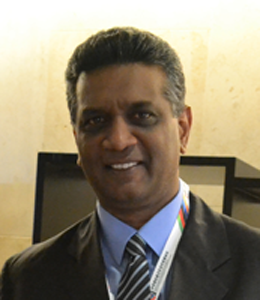
Lormus Bundhoo,
Mauritian Minister of Health and Quality of Life
China's health industry is probably the fastest growing in the world. We welcome Chinese investment in the pharmaceutical sector. Mauritius is strategically located, and China could very well consider Mauritius a stepping stone toward investing in Africa's medical equipment and pharmaceutical industry, helping to keep costs down and better serve the African market, and enhance the South-South cooperation. Also, Chinese people can invest in Mauritius to develop traditional medicine to attract people from African and Indian Ocean countries to receive medical treatment in Mauritius. Furthermore, we wish to thank the Chinese Government for the present construction of the 8,000-square-meter New Victoria Block, which, after its completion by December, 2014, will provide basic healthcare services.
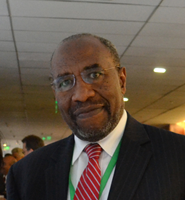
Ruhakana Rugunda,
Ugandan Minister of Health
We'd like to ask China to support us in capacity building, manufacturing essential medicines that Africa requires, and other technical areas that Africa will need in order to be able to sustain and support a health system and to ensure quality and affordable healthcare systems for our people. Africa should develop its own capacity to manufacture medicines, vaccines and other supplies, and China can play an important role in technology transfer. Besides, a lot of people in Uganda depend on traditional medicine, and we'd like to see further development of traditional medicine in Africa. So we hope we can cooperate in the fields of both traditional medicine and Western medicine. Our cooperation should be relevant, and it should build our capacity, which will empower and enable Africans to take charge of our own health issues.
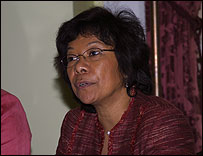
Peggy Vidot,
Principal Secretary at the Ministry of Health of the Republic of Seychelles
We appreciate that Chinese medical teams has helped us in improving the health status of our people and reducing mortality, and they have brought to our country certain diversity within our medical practice. We are grateful that China is always willing to share with Africa the benefits of the development that it has been pursuing. China has so much expertise in health management and the prevention of the non-communicable diseases (NCDs). I'd like to ask that the same sort of collaboration that China has engaged in in Africa within the field of communicable diseases is extended to NCDs as well. I hope that this will be a very important area of collaboration as we move forward.
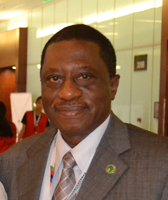
Mustapha Sidiki Kaloko,
Commissioner of Social Affairs at the African Union Commission
There are many challenges and problems facing Africa. Lack of social development is one of these problems. Only 10 percent of the workforce has social protection coverage. The other 90 percent, who work in the informal economy and the rural sector, are not covered. Now planning becomes very difficult because even registering those workers becomes difficult. About 50 percent of our population is currently under the age of 25, so demographic planning is problematic. Also development is so diverse in Africa. If you take health issues, for example, things are so different from one country to another, so at what level should you start? These are some of our problems, and health is the key issue in all this. And this is why I think this Ministerial Forum has become very important.

Nana Taona Kuo,
UNAIDS Country Coordinator a.i.
I'd like to give suggestions for some key areas for strengthening China-Africa health cooperation. First, Chinese state firms' trade and investment programs in Africa should be systematically encouraged to invest in local health, to allow current commercial investments and development in infrastructure to strengthen health systems in Africa. Second, in ensuring access to quality medicines and pharmaceutical commodities for Africa, China can play an important role in reducing the cost of drugs and other commodities, and also support Africa in building its own sustainability in drug production through technology transfer, joint venture cooperation, and private-public partnerships. The third area is establishing a strategic partnership with the African Union and various regional economic communities, because if we are looking at issues such as local production, we can only address them through a regional approach, because they are purely based on the market side.
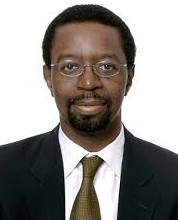
Olusoji Adeyi,
Sector Manager for Health, Nutrition & Population for Eastern & Southern Africa at the World Bank
At the African Health Forum 2013 hosted by the World Bank (WB) in Washington, D.C. in April, we learned from African leaders that they see health as an investment and are very interested in achieving positive results in health outcomes. We see many opportunities for China, Africa and the WB in this area. First, China wants to improve its own health outcomes, and so does Africa. They share the same aim of achieving results in health. Second, we see opportunities to build institutions, to improve institutions for the planning, management and evaluation of health programs. We also see big opportunities for China and Africa to learn together, to exchange experiences and to build stronger cooperation for health gains in the future.
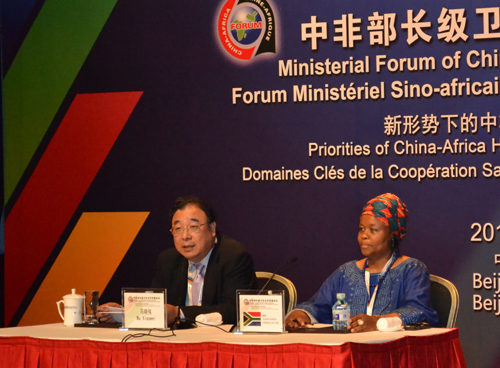 |
|
Ma Xiaowei, Vice Minister of the National Health and Family Planning Commission issues the Beijing Declaration, together with Gwendoline Malegwale Ramokgopa, Deputy Health Minister of South Africa (PHOTO BY LIU JIAN) |
|
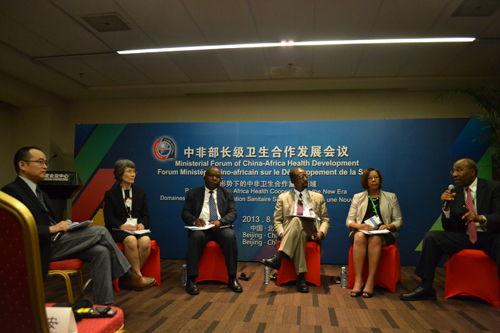
|
|
Chinese and African officials and scholars discussed health issues at the media briefing of the Ministerial Forum of China-Africa Health Development in Beijing on August 16, 2013 (PHOTO BY LIU JIAN) |
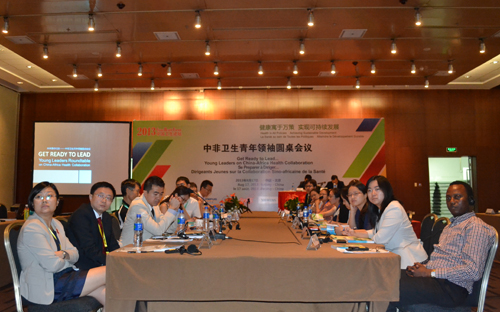 |
|
Over 60 young Chinese and African researchers, and representatives from international organizations, discussed key areas that young people can work on to contribute to China-Africa health cooperation at the Roundtable of Young Leaders on China-Africa Collaboration, a part of China Health Forum 2013 held on August 17 (PHOTO BY LIU JIAN) |
|